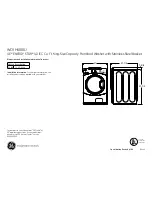
en
Detergent
32
Detergent
Description
Detergent con-
taining chlorine
Chlorine residue on table-
ware may present a risk to
health.
Information on detergents
Follow the instructions on detergents
in everyday use.
¡
Detergents marked as "organic" or
"ecological" (environmentally
friendly) generally contain lower
levels of active agents or com-
pletely dispense with certain sub-
stances. The cleaning effect may
be restricted here.
¡
Set the rinse aid and the water
softening system to the separate
detergent or combined detergent
in use.
¡
According to manufacturers, com-
bined detergents with salt replace-
ment substances can only be used
up to a certain water hardness,
usually 26 °E, without adding spe-
cial salt. For the best washing and
drying results we recommend us-
ing special salt from a water hard-
ness of 17 °E.
¡
To prevent sticking, only touch de-
tergents in a water-soluble pouch
with dry hands and only ever place
them in a dry detergent dispenser.
¡
Even if the rinse aid and special
salt refill indicators light up, wash-
ing programmes will run properly
with combined detergents.
¡
The function of rinse aid is limited
with combined detergents. You will
generally get better results using
rinse aid.
¡
Use tablets with a special drying
performance.
Adding detergent
1.
To open the detergent dispenser,
press the locking latch.
2.
Add the detergent to the dry deter-
gent dispenser.
15 ml
25 ml
50 ml
If you are using tablets, one is
enough. Insert the tablets in a hori-
zontal position.
If you are using powder or liquid
detergent, follow the manufac-
turer's instructions and quantities
for dosage in the detergent dis-
penser.
20 ml – 25 ml detergent is suffi-
cient for normal soiling. If table-
ware is only lightly soiled, slightly
less than the amount of detergent
specified is usually sufficient.
















































